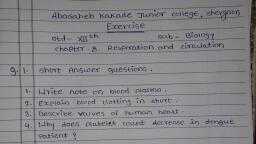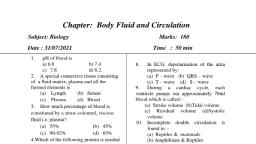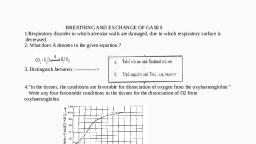Question Text
Question 2 :
<span>Which one of the following types of cells lack nucleus in humans?</span><span><br></span>
Question 3 :
Arrange the following in ascending order of their number per $mm^3$ present in blood.<br>(a) Basophils<br>(b) Lymphocytes<br>(c) Eosinophils<br>(d) Neutrophils<br>(e) Monocytes.
Question 7 :
<span>Which of the following is an important intermediate formed in all types of respiration?</span><span><br></span>
Question 21 :
Which one of the following mammalian cells are not capable of metabolizing glucose to carbon-dioxide aerobically?
Question 24 :
Maximum and Minimum Erythrocyte Sedimentation Rate (ESR) is found in which of the following infections, respectively?
Question 25 :
Which of the following is used as a modification by dehydrogenase enzyme in cell respiration?
Question 27 :
Which of the following minerals activate the enzymes involved in respiration?
Question 38 :
One mole of glucose on metabolism liberate about how many kilo calories of energy?
Question 45 :
Assertion: Fibrins are formed by the conversion of inactive fibrinogens in the plasma by the enzyme thrombin.
Reason: Plasma without fibrinogen and blood corpuscles is called serum.
Question 47 :
Assertion: Blood coagulates in uninjured blood vessels.
Reason: Uninjured blood vessels release an anticoagulant heparin.
Question 48 :
<span>Match the names of products with the reactions given under columns. Choose the correct answer, which gives correct combination of alphabets.</span><br/><table class="table table-bordered"><tbody><tr><td> </td><td> List I (<span>Products)</span></td><td> </td><td> List II (<span>Reaction)</span></td></tr><tr><td>A </td><td> <span>${H^{+}+OH^{-}}$</span></td><td>p</td><td> <span>Glycolysis</span></td></tr><tr><td>B </td><td> <span>Pyruvic acid</span></td><td>q</td><td> <span>Alcoholic fermentation</span></td></tr><tr><td> C</td><td> <span>${C_2 H_5 OH+ CO_2}$</span></td><td> r</td><td> <span>Chemosynthesis</span></td></tr><tr><td> </td><td> </td><td> s</td><td> <span>Photolysis of water</span></td></tr></tbody></table>
Question 49 :
In the process of respiration, in plants, 180 gm of glucose and 192 gm of oxygen produces

































